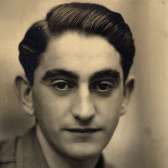
Shmuel Shalkovsky (now Sam Schalkowsky) is the son of Yitzhak and Chaya Kupershmidt Shalkovsky. He was born on May 23, 1925 in Kovno (Kaunas) Lithuania where his parents owned a shoe store. Shmuel was the youngest of six siblings, two of whom died at a young age. Three of his older siblings moved to Palestine in the early 1930’s. Shmuel’s father died in 1940, and his mother was left to run the store and care for Shmuel, her only surviving child in Kovno.
In June 1941, the Germans launched a surprise invasion of the Soviet Union and immediately occupied Lithuania. In August 1941, Chaya and Shmuel were forced to move into the Kovno ghetto. In February 1942, approximately 300 Jews were sent from the Kovno to the Riga ghetto, including Shmuel and his mother. His mother did the laundry of others in the ghetto to earn extra food and Shmuel worked in an airforce warehouse.
In the summer of 1943, the ghetto was liquidated and its surviving residents sent to the new Kaiserwald concentration camp outside of Riga. Shmuel was put in charge of work in one of the clothing warehouses, which gave him an opportunity to trade clothing for food. In September 1944, as the Soviet army was advancing toward Riga, the Germans liquidated the Kaiserwald concentration camp and sent its surviving inmates to the Stutthof concentration camp near Danzig. Shmuel’s mother perished in Stutthof. About a month or two later, Shmuel was transferred to the slave labor camp in Magdeburg to work making artillery shells.
In April 1945, as American and Soviet troops advanced on Magdeburg, the Germans guards marched the prisoners out of the camp. Shmuel and two friends made their way to the rear of the column and managed to escape.
After the war, because he knew English from high school, as well as several European languages, he was taken in by the War Crimes team as an interpreter and served with them for the next eight months, wearing an American army uniform.
In January 1946, the war crimes team completed its work and Shmuel secured a position at the Labor Office of UNRRA Headquarters in Arolsen, Germany. A friend from the War Crimes team continued to stay in touch and secured an American visa for Shmuel as his sponsor.
Shmuel arrived in the United States in July 1946. A few months after his arrival, he enlisted in the United States Army. He was sent to Korea and assigned to the Counter Intelligence Corps. He was discharged after ten months of service, and received full benefits under the GI Bill of Rights which he used to study at the Technion in Haifa in Palestine in October 1947. Shmuel joined the Hagannah and participated in the fighting around Haifa, in Tzfat and in Mishmar Ha-emek. Later, he was made an officer in the newly formed field artillery of the Israeli Defense Forces. Shmuel fought in Israel’s War of Independence and then returned to the United States in 1949 where he completed his engineering studies at Columbia University.










